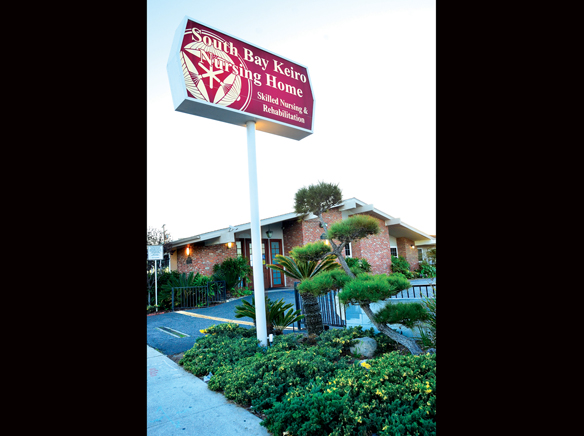Lack of public hearing among controversy in
pending sale; 600 residents could be affected
The sale of the South Bay Keiro Nursing Home is currently in a state of flux as protesters to the sale continue to express their outrage to state and city officials.
In an effort to be heard, the demonstrators gathered outside of the Los Angeles office of California Attorney General Kamala Harris, who approved the sale contingent upon the acceptance and enactment of conditions that she placed on the sale.
Lack of public hearing among controversy in
pending sale; 600 residents could be affected
The sale of the South Bay Keiro Nursing Home is currently in a state of flux as protesters to the sale continue to express their outrage to state and city officials.
In an effort to be heard, the demonstrators gathered outside of the Los Angeles office of California Attorney General Kamala Harris, who approved the sale contingent upon the acceptance and enactment of conditions that she placed on the sale.
The crux of the controversy surrounding the transaction is that the sale occurred without a public hearing for both the residents of the Keiro homes, which includes the Gardena home at the corner of Marine and Vermont avenues, as well as the general community to express their opinion on the sale itself.
Congresswoman Maxine Waters of the 43rd Congressional District, which includes Gardena, said that in addition to the lack of a public hearing, other factors should have prevented the sale from ever happening in the first place.
In a letter to Attorney General Harris, Waters mentioned her assertion that Pacifica Companies a for-profit real estate developer, is a banned licensee as well as her assertions that there was a lack of adherence to fair market value procedure, there was no up-to-date Keiro financial information, and community concerns regarding the issue of transparency.
These were among Waters’ concern in opposition to the Keiro sale.
At a press conference Jan. 14, at the First Southern Baptist Church in Gardena, Waters, along with California Congresswoman Judy Chu, reminded everyone of the importance of the Keiro Healthcare Center to the community.
“Since 1961, Keiro has been a trusted senior resource in the Japanese-American community,” Waters said. “With facilities located just across the street in my district in Gardena, as well as Boyle Heights and Lincoln Heights, Keiro has grown to become the largest non-profit healthcare organization serving the Japanese American community in the country.”
Chu, like Waters, believes in the importance of keeping the Keiro open and accessible to the hundreds of Japanese seniors in need of its services.
In a statement from her office, Chu said: “Caring for our parents is a universal imperative. But the obligation to respect, care for, and see to the needs of parents is particularly strong in the AAPI community, where devotion to family is deeply engrained in our culture. Keiro excels at meeting the needs of our parents in a culturally sensitive way. And that meaningful, compassionate care is exactly why the residents of Keiro moved to these facilities. Uprooting them now, without even holding a public hearing, is wrong and I am committed to reversing this sale. That is why when I first heard the news, from the Save Keiro Ad Hoc Committee, I immediately drafted a letter to California Attorney General Kamala Harris which attracted the signatures and support of 16 other Congress members.”
Keiro Senior Healthcare has provided non-profit health and residency services to Japanese-American elderly in the Greater Los Angeles Area including Gardena. If the nursing facility is sold, about 600 low-income seniors may lose the only health care services that they receive.
The plight of the Keiro nursing facilities has not gone unnoticed in the local government, recently the Gardena City Council passed a resolution opposing the sale of the Keiro nursing facilities.
Gardena City Councilman Dan Medina, who spearheaded the council’s resolution, said the lack of public hearings regarding the sale of Keiro touched on the basic issue of fairness.
“What they [Keiro] did was wrong,” Medina said. “It’s unfair to the people who sold their homes, gave all of their money to Keiro and said, ‘OK, you’ll take care of us for the rest of our lives.’ They were guaranteed five years of care and one of the reasons they [Keiro residents] picked Gardena was because they live near here, their family lives near here, this is something they’re acclimated to and you’re going to move them someplace else when the original agreement was for life? That’s not fair.”
Although Keiro Nursing Home has been approved for sale, mediation talks are occurring between Keiro, the Ad-Hoc Committee to save Keiro, the Department of Fair Employment and Housing, and the office of California Attorney General Kamala Harris.
In her letter to Attorney General Harris, Waters stated that the impending sale of the Keiro Nursing Homes and its adverse impact on the center’s residents, constituted an emergency that warranted immediate action in halting the sale until a thorough investigation and other impact studies can be conducted.
“The healthcare center has served over 130,000 families and was built upon the cultural value of respecting our elders. For over 50 years, a committed community, a competent and caring staff, and hundreds of dedicated volunteers have implemented this value to provide compassionate care and programs for Japanese American seniors in their twilight years.”
According to the Rafu Shimpo, Keiro sold its four locations in and around Los Angeles due to declining occupancy rates and the changing demographics within the Japanese-American community. Without the sale, Keiro said that it would be unable to continue to provide the high quality of care that its seniors need.




















